
APPLIED BIOCHEMISTRY AND BIOTECHNOLOGY
Scope & Guideline
Connecting Science and Technology for a Better Tomorrow
Introduction
Aims and Scopes
- Biochemical Engineering and Bioprocessing:
Focuses on the design and optimization of bioprocesses for the production of biochemicals, biofuels, and pharmaceuticals, utilizing various microbial and enzymatic systems. - Enzyme Technology and Biocatalysis:
Explores the development and application of enzymes in industrial processes, including enzyme immobilization techniques and the use of engineered enzymes for enhanced activity and specificity. - Bioremediation and Environmental Biotechnology:
Investigates the use of biological systems, including microorganisms and plants, for the removal of pollutants from the environment, focusing on innovative solutions for waste treatment and resource recovery. - Phytochemistry and Natural Products:
Studies the extraction, characterization, and application of bioactive compounds from plants, aiming to uncover their potential therapeutic and industrial applications. - Molecular Biology and Genetic Engineering:
Addresses advancements in molecular biology techniques, including CRISPR and gene editing, for the development of genetically modified organisms with improved traits for agriculture and medicine. - Nanobiotechnology:
Examines the synthesis and application of nanomaterials for drug delivery, biosensing, and as antimicrobial agents, emphasizing their role in enhancing the efficacy of biotechnological products.
Trending and Emerging
- Synthetic Biology and Metabolic Engineering:
This area has gained momentum as researchers explore the engineering of metabolic pathways in microorganisms to produce valuable biochemicals, highlighting the potential of synthetic biology in addressing global challenges. - Nanotechnology in Biotechnology:
Emerging applications of nanotechnology for drug delivery, biosensors, and environmental remediation are trending, showcasing the potential of nanomaterials to revolutionize various biotechnological applications. - Biotechnology for Sustainable Development:
There is a growing emphasis on research that aligns biotechnological innovations with sustainability goals, including waste valorization, bioenergy production, and eco-friendly bioprocesses. - Plant Biotechnology and Bioinformatics:
The integration of bioinformatics tools in plant biotechnology is on the rise, facilitating the study of plant genomes, metabolic pathways, and the identification of bioactive compounds. - Microbiome Research:
Studies focused on the human microbiome and its implications for health and disease are increasingly prominent, reflecting the growing recognition of the microbiome's crucial role in various biological processes.
Declining or Waning
- Traditional Fermentation Processes:
Research on conventional fermentation methods has decreased as newer technologies such as metabolic engineering and synthetic biology gain traction, allowing for more efficient production methods. - Basic Biochemical Studies:
There is a noticeable decline in purely fundamental biochemical studies that do not have direct applications in biotechnology, as the journal increasingly emphasizes translational research. - Animal-Based Studies:
Research involving animal models in biochemistry has waned, with a growing preference for in vitro systems and alternative methods that align with ethical considerations and regulatory demands. - Chemical Synthesis of Biochemicals:
The focus on traditional chemical synthesis methods for producing biochemicals is decreasing in favor of biocatalytic approaches that utilize enzymes and microorganisms for greener and more sustainable processes.
Similar Journals
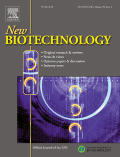
New Biotechnology
Shaping the Future of Biotechnology and MedicineNew Biotechnology, published by Elsevier, is a distinguished academic journal focused on the innovative realms of biotechnology and bioengineering. With an impact factor reflecting its strong presence in the field, this journal serves as a vital resource for researchers and professionals in the life sciences, offering insights into cutting-edge advancements and applications in biotechnology, molecular biology, and related disciplines. The journal's open access policy enhances its accessibility, allowing broad dissemination of knowledge and research findings. With a robust set of Scopus ranks placing it in the top tiers of its categories, including rank #36 in Biotechnology and #24 in Bioengineering, New Biotechnology represents a critical platform for scholars aiming to contribute to the ongoing dialogue in these rapidly evolving fields. Since its inception in 2008 and continuing through to 2024, the journal remains committed to fostering innovation and collaboration among scientists dedicated to advancing biotechnological applications, thereby significantly impacting medicine and industry.
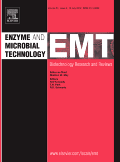
ENZYME AND MICROBIAL TECHNOLOGY
Connecting Researchers to the Future of Microbial TechnologyENZYME AND MICROBIAL TECHNOLOGY, a premier journal published by Elsevier Science Inc, serves as a pivotal platform for researchers and professionals dedicated to exploring the dynamic intersections of microbiology, biochemistry, and bioengineering. With a rich publication history dating back to 1979 and converging until 2024, this journal has established itself within the Q2 quartile rankings across multiple categories, including Applied Microbiology and Biotechnology, Biochemistry, Bioengineering, and Biotechnology, highlighting its influential role in advancing scientific discourse. It holds impressive Scopus rankings, where it is recognized in the 79th percentile for Applied Microbiology and Biotechnology and ranks favorably in related fields, making it a valuable resource for academic and industrial researchers looking to stay abreast of the latest developments. Although it does not currently offer Open Access options, ENZYME AND MICROBIAL TECHNOLOGY remains an essential read for anyone invested in the biotechnological applications of enzymes and microorganisms.

BIOSYSTEMS ENGINEERING
Fostering dialogue for groundbreaking agricultural research.BIOSYSTEMS ENGINEERING, published by Academic Press Inc. Elsevier Science, is a leading journal that has established itself as a key contributor in the fields of agronomy, crop science, animal science, food science, soil science, and control systems engineering. With an impressive position in the 2023 Category Quartiles, featuring Q1 rankings in Agronomy and Crop Science, Animal Science and Zoology, Food Science, and Soil Science, alongside a Q2 ranking in Control and Systems Engineering, this journal stands at the forefront of innovative research. Currently indexed in Scopus, it boasts a commendable track record, with its Agricultural and Biological Sciences rankings placing it in the 95th percentile for Agronomy and Crop Science and the 90th percentile for Soil Science, among others. With a commitment to disseminating critical advancements and fostering scientific dialogue, BIOSYSTEMS ENGINEERING offers an invaluable platform for researchers, professionals, and students alike, seeking to advance their understanding and application of engineering principles in biological systems. As a hybrid journal that provides both subscription and open access options, it ensures broad accessibility to high-quality research that shapes the future of sustainable agriculture and biological systems.

PREPARATIVE BIOCHEMISTRY & BIOTECHNOLOGY
Elevating scientific discourse in biochemistry and biotechnology.PREPARATIVE BIOCHEMISTRY & BIOTECHNOLOGY, published by Taylor & Francis Inc, serves as a vital platform for advancing research in the fields of biochemistry, biotechnology, and related areas of medicine. With an ISSN of 1082-6068 and an E-ISSN of 1532-2297, this journal has established itself with a notable Q3 ranking in the 2023 categories of Biochemistry, Biotechnology, and Miscellaneous Medicine, reflecting its relevance and contribution to these disciplines. The journal encompasses a wide range of topics, providing crucial insights into preparative methods, innovative biotechnological applications, and their implications for various medical advancements. Although not open access, the journal's rich content is crucial for researchers and professionals aiming to stay abreast of the latest developments and methodologies in biochemistry and biotechnology. With an enduring commitment to excellence since its inception in 1996, the journal remains an essential resource for academics and practitioners dedicated to advancing scientific knowledge and practical applications.
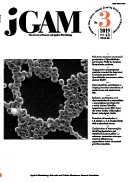
JOURNAL OF GENERAL AND APPLIED MICROBIOLOGY
Exploring the vital role of microorganisms in health and environment.JOURNAL OF GENERAL AND APPLIED MICROBIOLOGY, published by the MICROBIOL RES FOUNDATION, is a vital resource in the fields of applied microbiology and biotechnology, as well as in diverse medical applications, serving an academic community dedicated to advancing microbial science. Established in 1955, this journal has a rich history of disseminating innovative research and insights into the intricate world of microorganisms. With an ISSN of 0022-1260 and an E-ISSN of 1349-8037, the journal maintains high scholarly standards and robustness, reflected in its 2023 Scopus rankings placing it in the Q3 and Q4 quartiles within its categories. While primarily based in Japan, the journal engages a global audience, offering valuable contributions that inform both theoretical perspectives and practical applications in microbiology. Despite being a non-open-access publication, it provides pivotal research findings essential for academics, professionals, and students alike, fostering a deeper understanding of microbial impact on health and the environment.
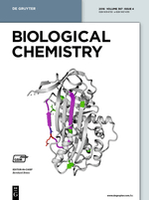
BIOLOGICAL CHEMISTRY
Advancing the Frontiers of Biochemistry and Molecular BiologyBIOLOGICAL CHEMISTRY, published by WALTER DE GRUYTER GMBH, is a premier journal based in Germany focusing on the ever-evolving fields of Biochemistry, Clinical Biochemistry, and Molecular Biology. With a robust reputation reflected in its top quartile rankings (Q1) within both Biochemistry and Clinical Biochemistry categories, and a commendable Q2 ranking in Molecular Biology for 2023, this journal stands as a vital resource for researchers, professionals, and students alike. The journal spans a rich history dating back to 1881 and embraces contemporary scientific discourse, ensuring accessibility to critical findings and advances that shape the biological sciences. Although it is not an open-access journal, its impactful contributions and relevant insights continue to serve the academic community. With its ISSN 1431-6730 and E-ISSN 1437-4315, BIOLOGICAL CHEMISTRY remains committed to fostering a deeper understanding of chemical processes in biological systems, driving innovation and research excellence into the future.
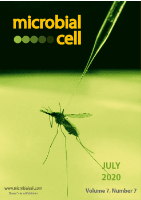
Microbial Cell
Innovating the study of microbial functions and genetics.Microbial Cell is a distinguished open-access journal published by SHARED SCIENCE PUBLISHERS OG, focusing on the dynamic fields of microbiology, biochemistry, and molecular biology. Since its establishment in 2014, Microbial Cell has been at the forefront of disseminating cutting-edge research essential for advancing our understanding of microbial functions and interactions. With a commendable impact factor and ranking in the top quartiles (Q1 and Q2) across several categories, including Applied Microbiology and Biotechnology and Parasitology, this journal serves as an invaluable resource for researchers, professionals, and students alike. It features a comprehensive scope that encompasses the latest findings in genetics, cell biology, and virology, facilitating the academic community's access to high-quality peer-reviewed work. Microbial Cell not only contributes to advancing microbial sciences but also fosters an inclusive platform for knowledge sharing and collaboration in the scientific community.

MOLECULAR BIOTECHNOLOGY
Advancing Knowledge in Applied Microbiology and BiotechnologyMOLECULAR BIOTECHNOLOGY, published by SPRINGERNATURE, is a pivotal journal in the fields of applied microbiology, molecular biology, biochemistry, and biotechnology. Since its inception in 1994, the journal has aimed to disseminate high-quality research that explores the intersection of molecular biology and technology, fostering advancements in biotechnology applications. With an ISSN of 1073-6085 and an E-ISSN of 1559-0305, it has established itself as a significant contributor to the scientific community, currently holding a Q3 ranking across multiple categories including Applied Microbiology & Biotechnology and Biochemistry in the 2023 metrics. Although not an open access publication, the journal remains accessible through various institutional subscriptions, providing valuable insights and findings to researchers and professionals. Given its ongoing commitment to quality and relevance, MOLECULAR BIOTECHNOLOGY serves as an essential resource for those involved in cutting-edge research and innovation in molecular biotechnology and related disciplines.
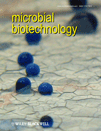
Microbial Biotechnology
Connecting academia and industry through cutting-edge discoveries.Microbial Biotechnology, published by WILEY, stands at the forefront of innovation in the field of applied microbiology and biotechnology, showcasing cutting-edge research and advancements within both academic and industrial contexts. As an Open Access journal since 2012, it ensures that high-quality research is easily accessible to researchers, professionals, and students globally, promoting knowledge sharing and collaboration. With an impressive impact, the journal holds a Q1 ranking in its categories—Applied Microbiology and Biotechnology, Biochemistry, Bioengineering, and Biotechnology—demonstrating its significance in the scientific community. The journal currently boasts a strong Scopus ranking in several relevant disciplines, including a top 10% position in Applied Microbiology and Biotechnology, highlighting its critical role in disseminating influential findings. Designed to foster dialogue and advance technology within the microbial sciences, Microbial Biotechnology is an essential resource for anyone committed to leveraging microbial processes for sustainable and innovative solutions.

Biocatalysis and Agricultural Biotechnology
Bridging Biotechnology and Agronomy for Global ImpactBiocatalysis and Agricultural Biotechnology, published by Elsevier, is a distinguished journal in the fields of agronomy, biotechnology, and applied microbiology. With an E-ISSN of 1878-8181, this journal has an impressive impact factor and consistently ranks in the top quadrants of Scopus, notably Q1 in Agronomy and Crop Science and Q2 in several related categories. Since its inception in 2012, it aims to bridge the gap between biocatalysis applications and agricultural practices, fostering innovative research that advances sustainable agriculture and biotechnological applications. The journal is highly regarded, with a Scopus rank of #47 out of 406 in Agronomy and Crop Science, exemplifying its significance in the academic community. As an essential resource for researchers, professionals, and students, it provides a platform for sharing cutting-edge findings that address crucial global challenges in food security, environmental sustainability, and biotechnological advancements. Located in Amsterdam, Netherlands, the journal continues to contribute to the growth and interdisciplinary dialogue in agricultural and biological sciences.